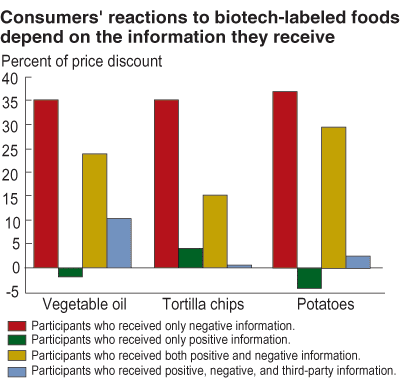Information Sways Consumers' Attitudes Towards Biotech Foods
- by Abebayehu Tegene
- 6/1/2003
Scientists use modern biotechnology (biochemical manipulation of genes or DNA) to develop new varieties of foods and agricultural products, commonly called biotech foods. Large shares of common crops, such as corn and soybeans, are grown from bioengineered seed. Many processed foods on U.S. supermarket shelves contain biotech ingredients.
Labeling of biotech foods has been a contentious issue in the U.S. and between the U.S. and its trading partners. Proponents of mandatory biotech food labeling argue that consumers have a right to know how their food has been produced. Opponents argue that such labeling will confuse and, in many cases, unnecessarily alarm consumers. In the U.S., when biotechnology introduces a known allergen or substantially changes a food’s nutritional content or composition, Federal regulations require that the label indicate this change. So far, no biotech foods on the market have required labeling.
In 2001, ERS and university researchers held experimental auctions to gauge consumers’ willingness to pay for food items with and without biotech labels. In the absence of sales data, experimental auctions more closely simulate purchasing behavior and better gauge consumer preferences than surveys of consumer attitudes. Auction participants could bid on and purchase three different food products—potatoes, vegetable oil, and corn tortilla chips—with and without a label indicating that the food contained biotech ingredients. None of the foods had biotech-enhanced attributes or traits that could be detected without sophisticated testing technologies, if at all.
Before the bidding, each participant received one of six information packets containing statements about biotechnology gathered from a variety of sources. Information played a powerful role in shaping how the participants responded to biotech foods. They reacted not just to the information itself, but also to whether the information came from biotech firms, an environmental advocacy group, or independent third-party sources.
Participants who received only pro-biotech information actually put a slight average premium of 2 percent on the biotech-labeled foods relative to foods without biotech labels for two of the three products. Participants who received only anti-biotech information discounted the biotech-labeled foods by an average of 36 percent. Those who received both pro- and anti-biotech information discounted the biotech-labeled foods by an average of 23 percent. Interestingly, participants placed a greater weight on negative information than on positive information, a result consistent with other studies. The ERS study also looked at the role of science-based information on consumer attitudes towards biotech foods.
This article is drawn from:
- Tegene, A., Huffman, W., Rousu, M. & Shogren, J.F. (2003). The Effects of Information on Consumer Demand for Biotech Foods: Evidence from Experimental Auctions. U.S. Department of Agriculture, Economic Research Service. TB-1903.


